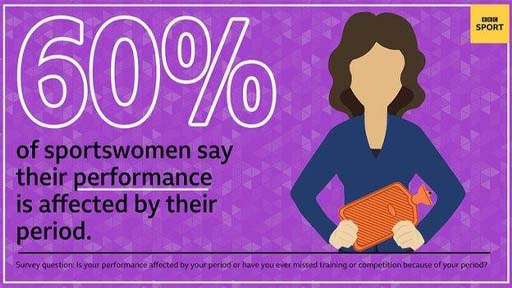1 Does the menstrual cycle impact on exercising females?
The BBC Elite British Sportswomen’s Survey [Tip: hold Ctrl and click a link to open it in a new tab. (Hide tip)] (2020) showed that 60% of sportswomen considered that their athletic performance had been affected by their period. This included missing training or competitions due to their period. British Tennis player Heather Watson, cited symptoms of her menstrual cycle as contributing to her early exit from the 2015 Australian Open. However, as is common with many human experiences, the menstrual cycle affects all females differently. For example, Paula Radcliffe broke the World Marathon world record in 2002 on the day her period started.
Clearly women experience their period and their menstrual cycle in different ways as each one’s body is unique, so there cannot be a one-size fits all approach to considering its impact. Recently, with help from social media, conversations around the menstrual cycle have become more common but there is still some discomfort about discussing it. Indeed in some social circles it is even taboo to discuss menstruation.
In the BBC Elite British Sportswomen’s Survey 40% of athletes said they did not feel comfortable discussing their period with their coach. Due to a shortage of knowledge many coaches and fitness trainers may not be having these important conversations with their athletes.
Some females can find that for a number of days each month, symptoms of their cycle such as cramping, bloating and pain impact or prevent their training. If so many days were being lost to a more openly accepted issue such as a knee injury or recurring migraines, then the athlete and those who support her would no doubt be exploring all possible solutions. The silence around periods and the menstrual cycle means that so many athletes still find it impacts their training and performance, when this shouldn’t be the case.
Organisations such as the English Institute of Sport (EIS) and The Well HQ are working hard to increase awareness of these issues. Before looking at the menstrual cycle complete Activity 1 to get you thinking about some the issues around the menstrual cycle.
Activity 1 Menstrual cycle myths and facts
a.
True
b.
False
The correct answer is b.
Discussion
False – on average you will lose about 2-3 tablespoons (45 ml) of blood over the length of a period which will have no impact on aerobic endurance. However, around 10% of females will experience heavy bleeding that may cause them to feel faint or dizzy, or even lead to iron deficiency.
a.
False
b.
True
The correct answer is a.
Discussion
False – this is a very dated view from the times when menstruating women were regarded as being ‘sick’. Exercise has beneficial effects during the period, like reducing menstrual cramping and period pain (Chisholm, 2020).
a.
True
b.
False
The correct answer is a.
Discussion
True – there is some truth to this as research is showing that strength gains are increased in the early phase (days 1 to 14) of the menstrual cycle (Pitchers and Elliott-Sale, 2019).
a.
True
b.
False
The correct answer is b.
Discussion
False – although there is some anecdotal evidence this may happen it is regarded as a myth. The myth developed partly due to a 1971 study which has now been discredited due to the method it used and its results have never been replicated in further studies.
a.
False
b.
True
The correct answer is b.
Discussion
True – regular menstrual cycles are linked to sexual function, fertility, bone health and cognitive function (Pitchers and Elliott-Sale, 2019). Any disruption to the menstrual cycle may not always be linked to exercise as it can have psychological or physiological causes.

